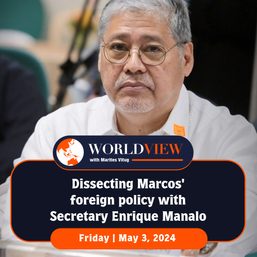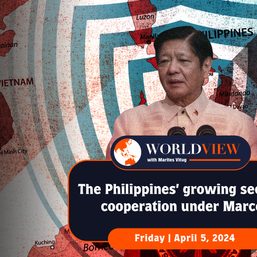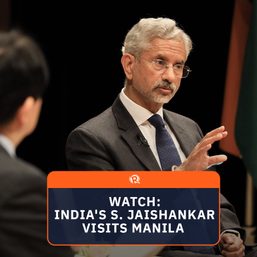SUMMARY
This is AI generated summarization, which may have errors. For context, always refer to the full article.
![[ANALYSIS] Trilateral cooperation among PH, US, Japan: Acceptability, implications, impact on regional security](https://www.rappler.com/tachyon/2023/06/TL-trilaterial-June-29-2023.jpg)
Last June 16, the National Security Advisers of the Philippines, the US, and Japan met formally for the first time this year to discuss matters of common security interests. This was the logical progression for three countries, which have been involved in interlocking bilateral security arrangements and commitments.
They have agreed to the following undertaking: to provide opportunities for combined maritime activities, such as multilateral joint naval exercises within the region; to advance cooperation on bilateral agreements by the Philippines with the US and Japan, such as the EDCA and reciprocal visits of officials; to promote maritime domain awareness (MDA) using Japan’s Official Security Assistance (OSA) mechanism, and the QUAD’s Indo-Pacific Partnership for Maritime Domain Awareness (IPMDA); to deepen cooperation in humanitarian assistance and disaster relief; and to promote economic security and economic resilience and address economic coercion.
It thus begs the question: what are the existing convergence points that makes a trilateral arrangement possible? First off, while we live in an imperfect democracy, we share with the US and Japan the values and aspirations for a society grounded on principles of a liberal-democracy; and a commitment to renouncing war as an instrument of national policy in adherence to the UN Charter. Both countries support the July 12, 2016 Arbitral Award on the South China Sea. All three countries are committed to uphold a rules-based international order, and a peaceful and stable Indo-Pacific region, along with other like-minded democracies in the world.
However, the most compelling driver, is a common objection to the coercive posture and excessive claims of the Chinese Communist Party (CCP) in the South China Sea, particularly our own EEZ.
In the near-term, we need to develop a credible deterrence to deal with the quasi-blockade imposed by China’s maritime forces at the Scarborough Shoal and the Second Thomas Shoal. China’s current coercive activities in the West Philippine Sea impinges against our energy and food security, while emerging concerns along the Luzon Strait can no longer be ignored because of a potential crisis in Taiwan. Beyond the Philippine Rise, the developments at the Solomon Islands augur the possibility of being trapped within its so-called “second island chain.” However, the more insidious challenge is developing the awareness and resiliency against the CCP’s malign influence efforts, which affects our domestic politics and bureaucracy.
Economically, the US is our leading trade partner for its export products in 2022, with a total value of $12.47 billion, and followed by Japan with approximately $11.13 billion. Japan explicitly supports the country’s efforts to attain Upper Middle Income Country (UMIC) status by 2025, by using its Official Development Assistance (ODA) fund, as well as private-sector investments amounting to JPY600 billion covering the current fiscal year. And hopefully, our concerns over supply chain resiliency, as well as food and energy security, would also be addressed.
Critics of the government’s foreign policy posture and national security agenda consistently argue that it is making a major mistake, and its actions will only aggravate our relations with China. However, this narrative is contrary to the position taken by a majority of Filipinos in recent surveys. Consistently, for the past years, it indicated that the US and Japan are the most trusted partners in the international community; and more than 80% opines that we should assert our rights in the WPS. China and the Chinese people are not our adversaries; it is actually the CCP, which has usurped parts off our EEZ, and whose maritime ambition is driving regional instability.
Realistically, we neither have the diplomatic nor the military gravitas to balance and deter China alone. We need to work with our US ally, in terms of maritime security, combined planning, interoperability, capacity-building, and military modernization, among others. With Japan’s inclusion in the arrangement, we mitigate the asymmetry of power inherent in the PH-US alliance, thus introducing a moderating influence in the emerging formation involving the three countries. A trilateral arrangement is in accord with our own country’s interests. It is not a perfect solution, but hopefully it creates the time and space for government to fill in our diplomatic, defense, and economic gaps in the immediate-term. At the end of the day, as a sovereign state, we have every right to defend our territory, protect our people, their property, and their way of life, in the manner that the we see fit. – Rappler.com
Rommel Jude G. Ong is a Senior Research Fellow, Ateneo Policy Center.
Add a comment
How does this make you feel?



![[OPINION] Expectations for Philippines-US-Japan trilateral cooperation: A view from Japan](https://www.rappler.com/tachyon/2024/04/tl-ph-usa-jp-cooperation.jpg?resize=257%2C257&crop=447px%2C0px%2C1080px%2C1080px)


There are no comments yet. Add your comment to start the conversation.